A Magna Carta for the Web?
It’s time we started paying more attention to the longer-term agenda by governments to control the internet and reassert their somewhat weakened control over our lives using the 21st Century equivalents of the Trojan Horse: moral panics, and claims that they need these new powers to “tackle” welfare fraud and identity theft, and “protect us” from terrorism and other national security threats, and so on.
In the wake of the mass of publicity about the National Security Agency’s PRISM online snooping initiative, International Business Times reported (8th June 2013): “Web Pioneer Tim Berners-Lee Warns of Government Bid to Control Internet ‘On the Sly”. According to the IBT report, Sir Tim Berners-Lee said:
Unwarranted government surveillance is an intrusion on basic human rights that threatens the very foundations of a democratic society.
I call on all web users to demand better legal protection and due process safeguards for the privacy of their online communications, including their right to be informed when someone requests or stores their data.
Over the last two decades, the web has become an integral part of our lives. A trace of our use of it can reveal very intimate personal things.
A store of this information about each person is a huge liability: Whom would you trust to decide when to access it, or even to keep it secure?
If you can control it, if you can start tweaking what people say, or intercepting communications, it’s very, very powerful. It’s the sort of power that if you give it to a corrupt government, you give them the ability to stay in power forever.
 We need to pay attention to Sir Tim Berners-Lee’s warning and ensure that a free and open internet forms part of the legacy that we leave the next generation. Perhaps on Magna Carta Day, 798 years on, a new Great Charter of Liberties is needed; this time to expound and protect our freedoms online…
We need to pay attention to Sir Tim Berners-Lee’s warning and ensure that a free and open internet forms part of the legacy that we leave the next generation. Perhaps on Magna Carta Day, 798 years on, a new Great Charter of Liberties is needed; this time to expound and protect our freedoms online…